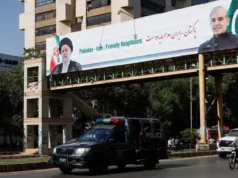Australians overwhelmingly agree climate emergency is nation’s No 1 threat
Lowy poll showing two-thirds of people say global warming is serious problem comes as shock UN report finds 1 million species at risk of extinction
A person walks past a mural showing prime minister Scott Morrison holding a lump of coal
New polling from a respected foreign policy thinktank underscores the point that 2019 is the climate change election, with a majority of Australians saying global warming is a critical threat.
The poll undertaken for Lowy says 64% of adults rank climate change number one on a list of 12 threats to Australia’s national interests, up six points from last year’s survey and a jump of 18 points since 2014.
The 2019 result is the first time climate has topped the list of threats since Lowy began the research in 2006. After climate change, cyberattacks ranks second, terrorism third and North Korea’s nuclear program fourth.
The Lowy result is consistent with private research undertaken by environmental groups and by the major political parties, which suggest climate change is surfacing as a concern in parts of the country normally sanguine about the issue.
The new poll comes as a shocking new report from the United Nations this week finds biodiversity is declining at an unprecedented rate, with one million species at risk of extinction, and human populations in jeopardy if the trajectory is not reversed.
New analysis funded by the Australian Conservation Foundation suggests the vast majority of threatened species habitat destruction in Australia over the last two decades has been concentrated in 12 federal electorates, nine of which are held by Liberal and National MPs.
In the Lowy poll, six in 10 of the sample say Australia needs to address the threat of climate change, even if that means incurring significant costs, which is a level of concern not seen in the data since 2006.
While 60% favour prompt action, 28% favour gradual action so the costs of the transition are lowered. Only 10% favour waiting until further evidence emerges.
The survey suggests climate change is a generational preoccupation. Three quarters of Australians aged 18-44 (76%, up six points from 2018) believe global warming is a “serious and pressing problem”, while fewer than half (49%) of Australians aged over 45 share this concern.
Climate change has been front and centre in the federal election, with the Coalition campaigning to discredit Labor’s policy of imposing an emissions reduction target of 45% on the basis that the costs of action are too high.
While the Coalition took a decision in December 2017 to use international permits as part of its climate policies – a decision it reversed in the lead-up to the campaign – Scott Morrison has spent the campaign attacking Labor for adopting the same stance in an effort to lower the costs of abatement.
The government has also attacked Labor for flagging it will impose a pollution standard for vehicles despite pursuing the same policy objective itself before abandoning the push because of opposition from motoring groups, the Institute of Petroleum and the National party.
Labor has countered the politicking by arguing climate change action incurs a cost, but the costs of not acting to deal with the threat are also high. Bill Shorten has declared that Australian politics is broken after a decade of partisan brawling about the issue, and the system won’t be restored to functionality until the parliament legislates a credible climate policy.
The Greens, which argue Labor’s policies are not ambitious enough, have called on Labor to establish a collaborative policy development process for climate policy along the lines of a process adopted in the 43rd parliament in the event Shorten wins on 18 May. Shorten has rebuffed that overture.
The Lowy poll indicates a majority of the sample believes Labor will do a more competent job at managing the threat of global warming than the Coalition. The Liberals are favoured over Labor on national security and economic management.
As Australians decide…
… on the future of our country, Guardian Australia’s unique independent ownership means we can provide factual, honest reporting without fear of interference.
More people are reading and supporting our independent, investigative reporting than ever before. And unlike many news organisations, we have chosen an approach that allows us to keep our journalism accessible to all, regardless of where they live or what they can afford.
The Guardian is editorially independent, meaning we set our own agenda. Our journalism is free from commercial bias and not influenced by billionaire owners, politicians or shareholders.
No one edits our editor. No one steers our opinion. This is important as it enables us to give a voice to those less heard, challenge the powerful and hold them to account. It’s what makes us different to so many others in the media, at a time when factual, honest reporting is critical.
Every contribution we receive from readers like you, big or small, goes directly into funding our journalism. This support enables us to keep working as we do – but we must maintain and build on it for every year to come.



